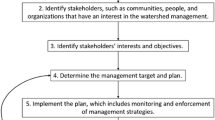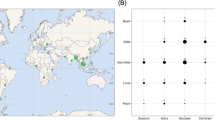Abstract
Research results in environmental and socio-economic sciences are often under-used by stakeholders involved in the management of natural resources. To minimise this gap, the FP6 EU interdisciplinary project AquaTerra (AT) developed an end-users’ integration methodology in order to ensure that the data, knowledge and tools related to the soil–water-sediment system that were generated by the project were delivered in a meaningful way for end-users, thus improving their uptake. The methodology and examples of its application are presented in this paper. From the 408 project deliverables, 96 key findings were identified, 53 related to data and knowledge, and 43 describing advanced tools. River Basin Management (RBM) stakeholders workshops identified 8 main RBM issues and 25 specific stakeholders’ questions related to RBM which were classified into seven groups of cross-cutting issues, namely scale, climate change, non-climatic change, the need for systemic approaches, communication and participation, international and inter-basin coordination and collaboration, and the implementation of the Water Framework Directive. The integration methodology enabled an assessment of how AT key findings meet stakeholders’ demands, and for each main RBM issue and for each specific question, described the added-value of the AT project in terms of knowledge and tools generated, key parameters to consider, and recommendations that can be made to stakeholders and the wider scientific community. Added value and limitations of the integration methodology and its outcomes are discussed and recommendations are provided to further improve integration methodology and bridge the gaps between scientific research data and their potential uptake by end-users.







Similar content being viewed by others
References
Borowski I, Hare M (2007) Exploring the gap between water managers and researchers: difficulties of model-based tools to support practical water management. Water Resources Management 21:1049–1074
Chapman AS, Brils J, Ansink E, Herivaux C, Bouzit M, Bardos RP, Strosser P (2006) Validation report on conceptual model incorporating results of the stakeholder consultation phase, presenting the natural science and socio-economic factors. Deliverable INTEGRATOR I2.5 EC Framework 6 Project AquaTerra, Project no. 505428 (GOCE), December 2006. www.eu-aquaterra.de
Chapman AS, Bardos P, Bardos A, Merly C (2009) Finalised website report, AquaTerra Online Information System (ATOIS), April 2009 (Project no. 505428 (GOCE)) Aquaterra Project (Project no. 505428 (GOCE)), Deliverable Integrator 3.13. http://www.aquaterra.uni-tuebingen.de/51.0.html. Accessed November 5, 2009
Chapman AS, Quevauviller P, De Lange W, Vervier P (2010) The role of translators in science-policy interfacing. In: Quevauviller Ph (ed) Water system science and policy interfacing. Royal Society of Chemistry, London
Frauenstein J, Bardos RP, Chapman AS (2010) EUGRIS—more than a database. In: Quevauviller Ph (ed) Water system science and policy interfacing. Royal Society of Chemistry, London
Macleod CJA, Scholefield D, Haygarth PM (2007) Integration for sustainable catchment management. Science of the Total Environment 373:591–602
Merly C, Chapman AS, Brils J (2007) Report on potential collaboration with other FP6 funded projects/integration within projects on same scientific issues Aquaterra Project (Project no. 505428 (GOCE)), Deliverable Integrator 3.5. http://www.aquaterra.uni-tuebingen.de/51.0.html. Accessed November 26, 009
Merly C, Mouvet C, Graveline N, Bouzit M, Hérivaux C, Chapman AS (2009) Synthesis of scientific results based on first and second WP leaders’ consultations (including synthesis of database) with recommendations for general conceptual scheme (Project no. 505428 (GOCE)), Deliverable Integrator 3.12. http://www.aquaterra.uni-tuebingen.de/51.0.html. Accessed November 26, 2009
Pahl-Wostl C (2007) The implications of complexity for integrated resources management. Environmental Modelling & Software 22:561–569
Quevauviller P (2006). Introduction to WISE—Water Information System for Europe. Presentation at the 3rd Hamoni-CA forum & conference, 5–7th April 2006. http://www.harmoni-ca.info. Accessed November 5, 2009
Quevauviller P (2010) Water system science and policy interfacing. RSC Publishing, London
Slob AFL, Rijnveld M, Chapman AS, Strosser P (2007) Challenges of linking scientific knowledge to RBM policy: AquaTerra as a case study. Environmental Pollution 148(3):867–874
Sutherland WJ et al (2006) The identification of 100 ecological questions of high policy relevance in the UK. Journal of Applied Ecology 43:617–627
Acknowledgments
This work was supported by the European Union FP6 Integrated Project AquaTerra (Project no. GOCE 505428) under the thematic priority ‘‘Sustainable Development, Global Change and Ecosystems”. The views expressed are purely those of the writers and may not under any circumstances be regarded as stating an official position of the European Commission.
Author information
Authors and Affiliations
Corresponding author
Electronic supplementary material
Below is the link to the electronic supplementary material.
Rights and permissions
About this article
Cite this article
Merly, C., Chapman, A. & Mouvet, C. An End-Users Oriented Methodology for Enhancing the Integration of Knowledge on Soil–Water-Sediment Systems in River Basin Management: An Illustration from the AquaTerra Project. Environmental Management 49, 111–129 (2012). https://doi.org/10.1007/s00267-011-9772-7
Received:
Accepted:
Published:
Issue Date:
DOI: https://doi.org/10.1007/s00267-011-9772-7




